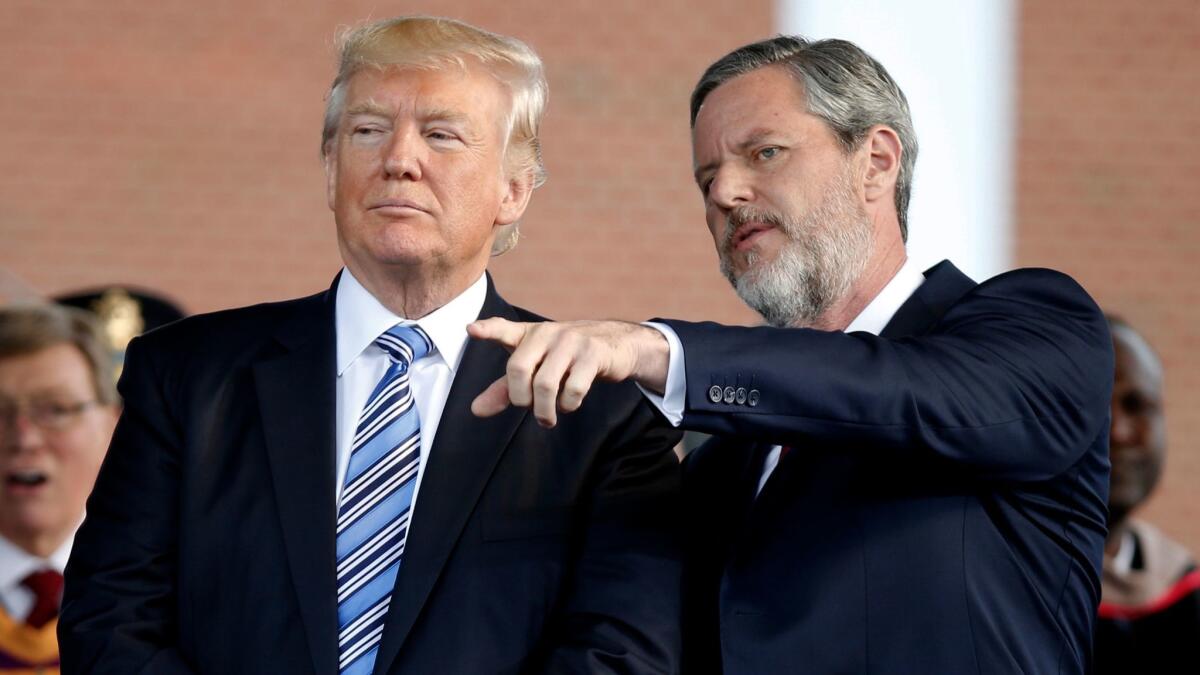What took Christianity Today so long to confront Trump?

- Share via
Since the 2016 presidential election, I’ve written and lectured frequently about the death of evangelicalism, how a movement once distinguished for its concern for those Jesus called “the least of these” systematically and determinedly debased itself by aligning with the far-right fringes of the Republican Party. Beginning with Ronald Reagan in the late 1970s, evangelicals turned their backs on their own best traditions of caring for the poor and welcoming the stranger to embrace a series of deeply flawed politicians and policies inimical to the teachings of Jesus.
This misbegotten alliance reached its nadir in 2016, when 81% of white evangelicals helped propel into office the most vulgar and corrupt president in American history. (Ulysses Grant, Warren Harding and Richard Nixon might give Donald Trump a run on corruption, but no president surpasses him on vulgarity.)
Sometimes at the conclusion of this tragic declension narrative, I try to inject a note of hope. I recall the New Testament story of Jesus raising Lazarus from the dead even though Lazarus’ body had begun to decay. If Jesus could do that, it’s possible that he could revive evangelicalism.
On Thursday, Lazarus didn’t exactly rise, but the pinkie finger on his left hand began to twitch.
Mark Galli, editor in chief of Christianity Today, the flagship magazine of evangelicalism, published an editorial calling for Trump’s ouster. “Whether Mr. Trump should be removed from office by the Senate or by popular vote next election — that is a matter of prudential judgment,” Galli wrote. “That he should be removed, we believe, is not a matter of partisan loyalties but loyalty to the Creator of the Ten Commandments.”
That statement may not rise to the level of profile in courage, but it’s significant, nonetheless. And as Trump loyalists attacked in response, the president and CEO of Christianity Today doubled down.
The media have dutifully reported these developments, some sources with perhaps a hint of satisfaction. But before we get carried away and suggest that Galli be bronzed and set on a pedestal, allow me to place the editorial in perspective and fulfill the journalistic obligation of full disclosure.
From 1999 until 2013, I was on the masthead of Christianity Today as senior writer, advisory editor and editor at large; during that time, I wrote book and movie reviews and nine feature articles for the magazine, three of them cover stories. When Galli took over as editor, however, my assignments slowed to a trickle and then disappeared altogether.
I have a file of correspondence on the matter, but Galli’s objection can be characterized as disappointment that I refused to fall in line with the agenda of the religious right. Specifically, he didn’t like that I persisted in pointing out that the religious right was born in the 1970s not out of concern for abortion — evangelicals considered abortion a Catholic issue then — but to defend racial segregation in evangelical institutions.
Galli also didn’t appreciate my stand on abortion, expressed in venues other than the magazine, that the government should have no jurisdiction whatsoever over gestation, and that anyone serious about reducing the rate of abortion should treat is as a moral issue rather than a legal one. I have no interest in making abortion illegal; I would like to make it unthinkable.
The point here is not Galli’s treatment of me; I can take care of myself. The point is that throughout Galli’s tenure as editor — at least until Thursday (he is set to retire at the end of the month) — Christianity Today has been marching in something close to lockstep with the religious right.
Where was Galli and the unequivocal editorial voice of Christianity Today when George W. Bush and Dick Cheney recklessly invaded Iraq and Afghanistan in clear violation of just-war principles? What did the editorial page of Christianity Today have to say when 24% of Americans, including a larger percentage of evangelicals, bought into the nonsense that Barack Obama was a Muslim?
What resistance did Galli and Christianity Today mount when Trump and Senate Majority Leader Mitch McConnell (R-Ky.) slammed through massive tax cuts for the affluent? What alarms did Galli and Christianity Today sound when Franklin Graham, Jerry Falwell Jr., Tony Perkins, Robert Jeffress, Ralph Reed and James Dobson slobbered over Trump, the self-confessed sexual predator, during the 2016 campaign?
I concede that I may have missed some signs of deviation from the right-wing norm, but when I returned to the magazine’s online archive to check my memory, I mostly encountered a lot of fawning over the likes of Michele Bachmann and Mike Huckabee outside of the editorial pages.
Assuming the mantle of prophet is all well and good. But a prophetic voice seeks to avert calamity rather than redress it.
I’m pleased with the Christianity Today editorial. The left hand of Lazarus shows some signs of life. What took so long?
Randall Balmer is a religion professor at Dartmouth College and the author of more than a dozen books, including “God in the White House: How Faith Shaped the Presidency from John F. Kennedy to George W. Bush.”
More to Read
A cure for the common opinion
Get thought-provoking perspectives with our weekly newsletter.
You may occasionally receive promotional content from the Los Angeles Times.









